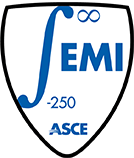Structural and Infrastructure Hazard Mitigation under Current and Changing Climate
University of California Davis
Problems
Structural and infrastructure systems are subject to multiple independent and/or interacting hazards, which cause extreme economic, societal, and environmental losses in the US and worldwide every year. These losses are expected to increase significantly in the immediate future due to a combination of adverse trends, including structural and infrastructure aging, increased vulnerability of the built environment, and the impacts of climate change on the severity of extreme weather events. As a result, the uncertainty in the performance of structural and infrastructure systems is continuously increasing, rendering a probabilistic approach to hazard mitigation even more necessary. At the same time, our modern society is recognizing the need for sustainable development with respect to the three pillars of social, economic, and environmental sustainability, which is requiring profound changes in the practice of civil and structural engineering.
Approach
Our main research goal is reaching a better understanding of the mechanical behavior and performance of structural and infrastructure systems, taking into account the stochastic nature of structural and material properties, as well as the loading environment. Our expertise encompasses both traditional and innovative construction methodologies and materials, with particular emphasis on new recycled and green materials. Our research is at the junction of two fundamental branches of structural engineering and engineering mechanics: deterministic computational structural mechanics and probabilistic analysis of structural and infrastructural systems. It focuses on the development and integration of probabilistic and reliability methods with state-of-the-art high-fidelity mechanics-based finite element modeling of large-scale real-world structural, geotechnical, and infrastructural systems.
Our research group has worked extensively on non-stationary stochastic problems, with an emphasis on time-dependent structural issues such as those arising in aging infrastructures and increasing environmental hazards due to climate change. We are active in the development of performance-based methodologies in earthquake, wind, and hurricane engineering, as well as in multihazard applications.

Findings
New material constitutive models for FRP-confined concrete, mortar-block masonry interfaces, shear-slip relationships. New nonlinear finite element response and response sensitivity algorithms. Closed-form solutions for classical random vibration problems and their application to structural reliability. New Performance-Based Engineering frameworks for hurricane and multihazard engineering. Invention of a new green concrete and development of other sustainable materials.
Impact
Our research will lead to safer, economic, and more rational design procedures, accounting for natural and man-made hazards, which support the development of sustainable infrastructures and more resilient communities under current and changing climate conditions.
Core competencies
- Nonlinear Finite Element Analysis
- Modeling/Analysis/Design of RC, Steel, Steel-Concrete Structures and Soil-Foundation-Structure Interaction Systems
- Deterministic and Stochastic Structural Dynamics
- Structural Reliability Analysis
- Performance-Based Engineering Applied to Earthquake/Wind/Hurricane/Multihazard Engineering
- Multihazard Assessment and Mitigation under Current and Changing Climate Conditions
- Valorization of Waste and By-product Materials for Construction Applications
Current research group members
- Michele Barbato (Faculty)
- Nitin Kumar (Ph.D. Student)
- Mirsardar Esmaeili (Ph.D. Student)
- Diogo Zignago (Ph.D. Student)
Recent graduates
- Vipin Unnithan (Ph.D.)
- Yasser Bigdeli (Ph.D.)
- Marvin Bowman (M.S.)
- Alexander Herbin (M.S.)
- Sara Ghazizadeh (M.S.)
- Dan (Claire) Hu (M.S.)
- Srinivasa Bellamkonda (M.S.)
- Taylor Alphonso (M.S.)
- Yueqiang (Mason) Sui (M.S.)
- Jad El-Khoury Antoun (M.S.)


